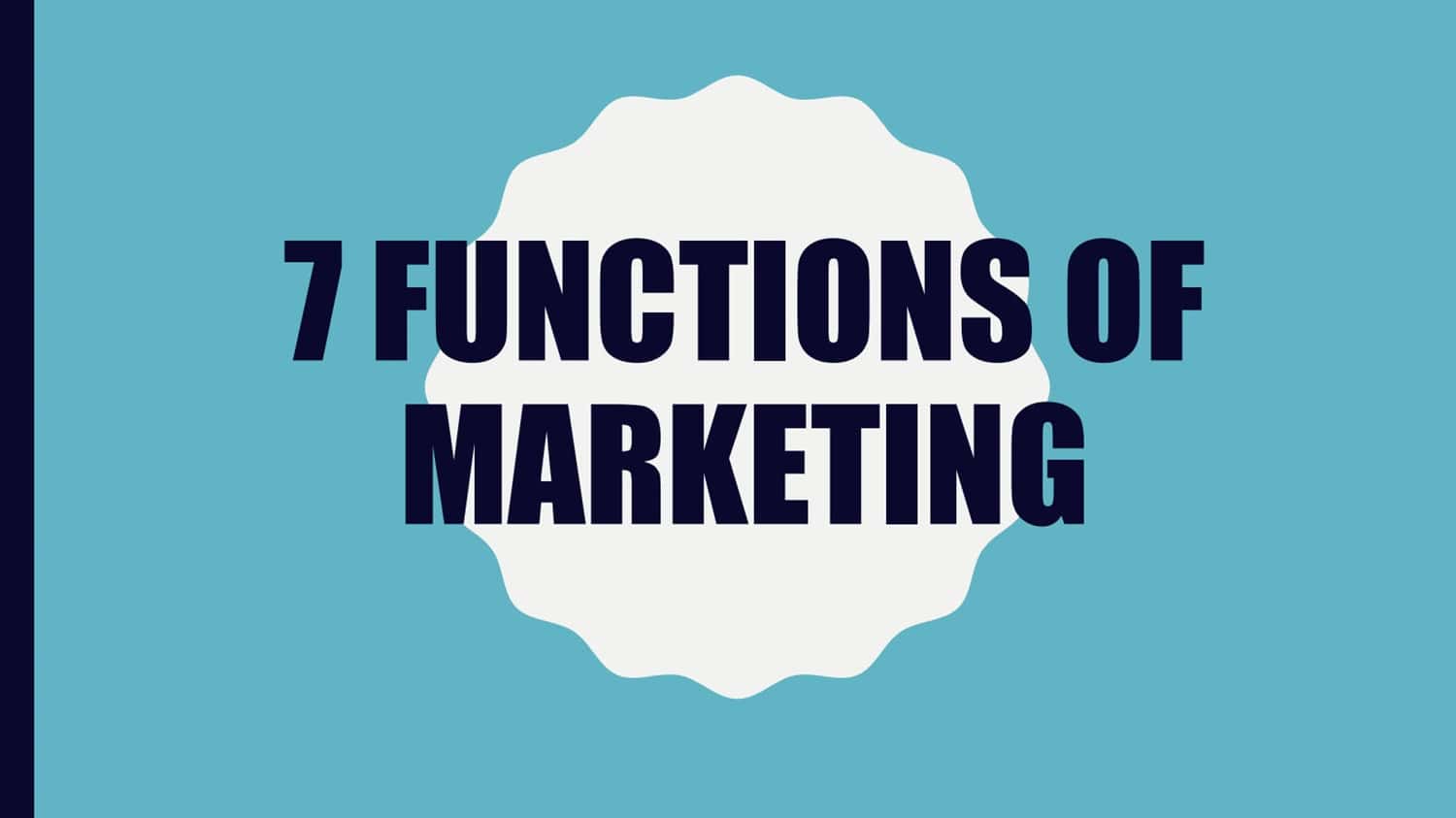Have you ever wondered how all the products and services reach customers? It’s not magic, it’s marketing! Marketing plays a vital role in helping businesses connect with customers and grow. At its core, marketing performs seven essential functions that help make this connection possible.
The 7 core functions of marketing are research, development, communication, financing, management, pricing, and distribution.
The functions of marketing help businesses understand customers, create offerings people want, spread the word, get budgets, oversee projects, choose reasonably priced products, and ensure broad access. Moreover, in this article, we will explore what are the seven functions of marketing. Additionally, these functions play a crucial role in shaping a company’s success. Furthermore, by understanding these functions, businesses can strategize effectively to meet market demands. Furthermore, each function interconnects, forming a comprehensive marketing framework. Consequently, businesses can streamline their operations and optimize their marketing efforts. Additionally, through a thorough understanding of these functions, companies can adapt to market conditions efficiently.
See Also: What Is A Boilerplate In Marketing? Definition & How To Write One?
What are the functions of marketing?
Marketing functions are the key activities that help a business achieve its goals. This includes researching customers, developing products, setting prices, promoting items, selling to customers, and distributing goods.
Working together, the marketing functions help businesses understand buyers, create offerings people want, and effectively get products into customers’ hands. So this iswhat are the functions of marketing.
Why do you need to understand all 7 marketing functions?
It is essential to understand all seven marketing functions because they work interdependently to achieve the goals of a business. Each function informs the next, and integrating them ensures success. For example, product management impacts promotion strategies, and distribution affects the results of promotions. Understanding customer insights from information management helps improve other functions.
Understanding product management helps inform what you promote on social media. For instance, knowing a product’s key features and benefits can guide the type of content shared on platforms like Facebook, Twitter, or Instagram. This social media promotion can be handled effectively with the help of a social media marketing agency with expertise in creating engaging posts around a company’s products or services.
Digital strategies also connect the functions. Moreover, for instance, social media helps with both promotion and market research. Additionally, tracking online customer behavior provides valuable data for information management. Furthermore, a unified approach that considers all functions delivers the best outcomes for marketing campaigns. Consequently, this includes increased sales, more leads, and a greater return on investment. Additionally, by integrating digital strategies with traditional marketing approaches, businesses can enhance their reach and effectiveness in the digital age. Moreover, such strategies foster engagement and build brand loyalty among target audiences.
See Also: Business Strategy vs Marketing Strategy: Main Difference
7 Functions of Marketing
Marketing is essential for any business to succeed. Seven core functions of marketing help businesses reach customers and make sales. Understanding these functions can assist you in creating a solid marketing plan.
Marketing Information Management
Marketing information management plays a vital role in business decision-making. Businesses can gain valuable insights to understand their target audience better and make informed strategic choices through systematic collection and analysis of relevant customer, competitor, and market data.
This includes determining the right target segments, uncovering customer needs and pain points, analyzing competitive strengths and weaknesses, and more. Such market research helps businesses develop superior products and services, optimize pricing, craft effective promotional strategies, and distribute offerings through appropriate channels to gain a competitive edge.
Resources for Further Learning
Let us read on to know about it:
- Marketing research books from reputed authors
- Online marketing courses on platforms like Coursera, Udemy, and Skillshare
- Industry blogs from sources like the American Marketing Association, MarketingProfs
- Websites of market research firms like Nielsen, Forrester, Gartner
- Tools for data collection like Google Analytics, Hotjar, SurveyMonkey
- First-hand customer research through surveys and focus groups
- Benchmarking against leaders and competitors in the industry
Financing
Financing is one of the vital functions of marketing. It helps by providing funds for various marketing activities.
Every marketing function requires capital investment; moreover, from market research to promotion and distribution, securing adequate financing is crucial for a business’s long-term success and growth. Additionally, without sufficient funds, even the most innovative marketing strategies may struggle to gain traction. Furthermore, a well-planned financial strategy enables companies to adapt to market changes and seize new opportunities. Hence, prioritizing financial stability ensures sustainability in the dynamic landscape of business.
Strategies for Securing Financing
Let us read on to know about it:
- Creating a comprehensive marketing budget that outlines the funding needs for various marketing activities and justifies the expected returns
- We communicate the ROI of past marketing campaigns through relevant metrics, such as increased sales, higher customer retention, improved brand awareness, etc.
- Leveraging market research data on target customers’ competitive landscape analysis to provide valuable insights for securing funds
- Maintaining financial prudence through tools like an online budget planner to track marketing expenses
- Presenting a clear strategic marketing plan backed by data-driven insights to convince potential investors and lenders about the return on their investment
- Highlight how the requested funds will be used to achieve important business goals such as revenue growth and customer acquisition.
- Considering multiple financing options like bank loans, venture capital, and angel investors depending on the funding needs and stage of business
Product and Service Management
Product and service management is one of the crucial functions of marketing, and it involves overseeing all aspects of a product from conception to end of life. Effective product management ensures that businesses develop solutions that create value for customers.
Tools for Effective Product Management
Let us read on to know about it:
- Product roadmaps to plan features, development, and launch timelines
- User research methods like surveys, interviews, and usability testing
- Agile development framework for rapid iterations
- Issue tracking software to manage bugs and tasks
- Analytics to understand customer behavior and product usage
- A/B testing to compare design variations
- Documentation of product specifications and requirements
Pricing
Product managers can develop high-quality solutions that address customer pain points and needs using a systematic product development process and the right tools. This enhances customer satisfaction and drives business growth.
Pricing is a crucial marketing function that determines customers’ willingness to purchase. Setting the right price is complex and involves considering multiple factors related to production costs, perceived value, competition, etc. Prices must signal quality without being too high for the target market. Getting this balance right impacts sales and profits.
Factors Influencing Pricing Decisions
Let us read on to know about it:
- Production costs and desired profit margins
- Value offered to customers in terms of quality, performance, and intangible benefits
- Prices of competitors’ similar offerings
- Customers’ price sensitivity and budget for the product/service category
- Impact of price on brand image and perceived status
Methods for Determining Price
Let us read on to know about it:
- Cost-plus pricing: Adding a percentage markup to the total costs
- Perceived value pricing: Basing prices on how valuable customers perceive the product to be
- Competition-based pricing: Matching or adjusting prices based on competitors
- Demand-based pricing: Adjusting prices according to demand levels and elasticity
- Psychological pricing: Using specific price points like $9.99 that signal better value
Promotion
Promotion is a marketing function that involves creating awareness about products and services through advertising, sales promotions, public relations, social media marketing, and direct marketing channels to increase sales and boost brand visibility.
Role of Promotion in Marketing Mix
Promotion helps communicate the unique value proposition of products/services to potential customers. It is an integral part of the marketing mix that builds brand awareness and generates demand. Promotional activities inform, educate, and persuade target audiences to purchase products and services.
Techniques for Developing a Promotional Strategy
Let us read on to know about it:
- Identify promotional objectives and target audience.
- Develop messaging aligned with brand identity and values.
- Choose appropriate promotional channels like print, TV, online, etc.
- Design effective creative assets like advertisements, brochures, etc
- Implement integrated promotional campaigns.
- Measure results and optimize strategy-based performance.
- Maintain consistency in brand voice across all touchpoints.
Selling
Selling is one of the crucial functions of marketing that involves nurturing leads through the buyer’s journey and closing sales.
It is essential for revenue generation as it is the final step where a product or service is exchanged for monetary value, thus generating income for the business.
Strategies for Making Sales
Let us read on to know about it:
- Communicate with customers at every stage of the buyer’s journey through various channels to move them down the funnel toward a purchase.
- Target content to each stage – generate awareness, provide information in the consideration stage, guide buyers in the decision stage
- Leverage tools like email marketing, webinars, and guides to encourage customers to proceed further in the buying process
- Train and equip the sales team with product knowledge to address customer queries and objections effectively.
- Offer incentives, discounts, or limited-period offers to entice customers to complete purchases.
- Provide multiple payment options and customer financing to remove barriers for customers.
- Collect and analyze sales data to optimize strategies and streamline the sales process for better results.
Distribution
Distribution defines how and where your customers can buy your products. It involves making the products available and accessible for customers to purchase.
Distribution is a crucial marketing function that deals with how customers can access and obtain products and services. It involves selecting appropriate distribution channels that complement the target market and align with overall business objectives. Effective distribution strategies consider convenience for customers as well as operational efficiency.
Importance of Distribution Channels
Distribution channels play a vital role in fulfilling the purpose of marketing communications by delivering products to customers. They impact factors like convenience and exclusivity. An optimal distribution strategy is essential for effective fulfillment of customer needs.
Methods for Optimizing Distribution
Let us read on to know about it:
- Evaluating existing distribution channels and selecting the most suitable ones based on target market and goals
- Partnering with efficient distributors and retailers that have established networks
- It provides multiple purchasing options like e-commerce stores, in-person stores, wholesale, etc.
- Implementing reliable order fulfillment and speedy delivery systems
- Facilitating easy access through strategic placement of inventory across locations
- Optimizing supply chain operations for demand forecasting, warehousing, and transportation. So this is what are the 7 functions of marketing are.
See Also: E-Commerce vs Digital Marketing: Understanding the Distinctions
FAQs
What is the most critical function of marketing?
All the functions are essential, but promotion is often seen as the core of marketing. Promotion brings awareness to your brand and messages, which leads people to consider and purchase your products. With the promotion, potential customers may know you exist.
What is the marketing function responsible for?
The marketing function oversees many responsibilities, but overall, it is responsible for understanding customers and creating value for them. Marketing analyzes data to learn what people want. Then, it develops products and services to meet those needs. Marketing communicates this value to customers through promotion as well.
How many main functions does marketing have?
There are seven main functions of marketing: promotion, selling, product/service management, pricing, distribution, marketing information management, and financing. Each covers an essential aspect of running marketing operations and bringing products to people.
Why is selling a vital marketing function?
While marketing is about more than just sales, selling is crucial because it generates revenue. All the marketing work builds the brand, develops products, and promotes leads up to the point of sale. When customers purchase, it means the business model is working. Selling is how marketing justifies itself through financial returns.
Conclusion
These seven core functions of marketing form the foundation for crafting effective Marketing Solutions. Businesses can create comprehensive marketing solutions by delving into customer research, product development, value communication, fund securing, offering management, pricing strategies, and distribution planning.
These solutions bridge the gap between what companies offer and what customers desire, fostering increased sales and overall organizational growth. Rooted in these core functions, marketing solutions empower businesses to align their strategies with customer needs, enhancing their competitive edge in diverse markets.









